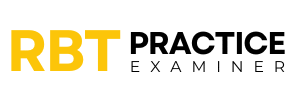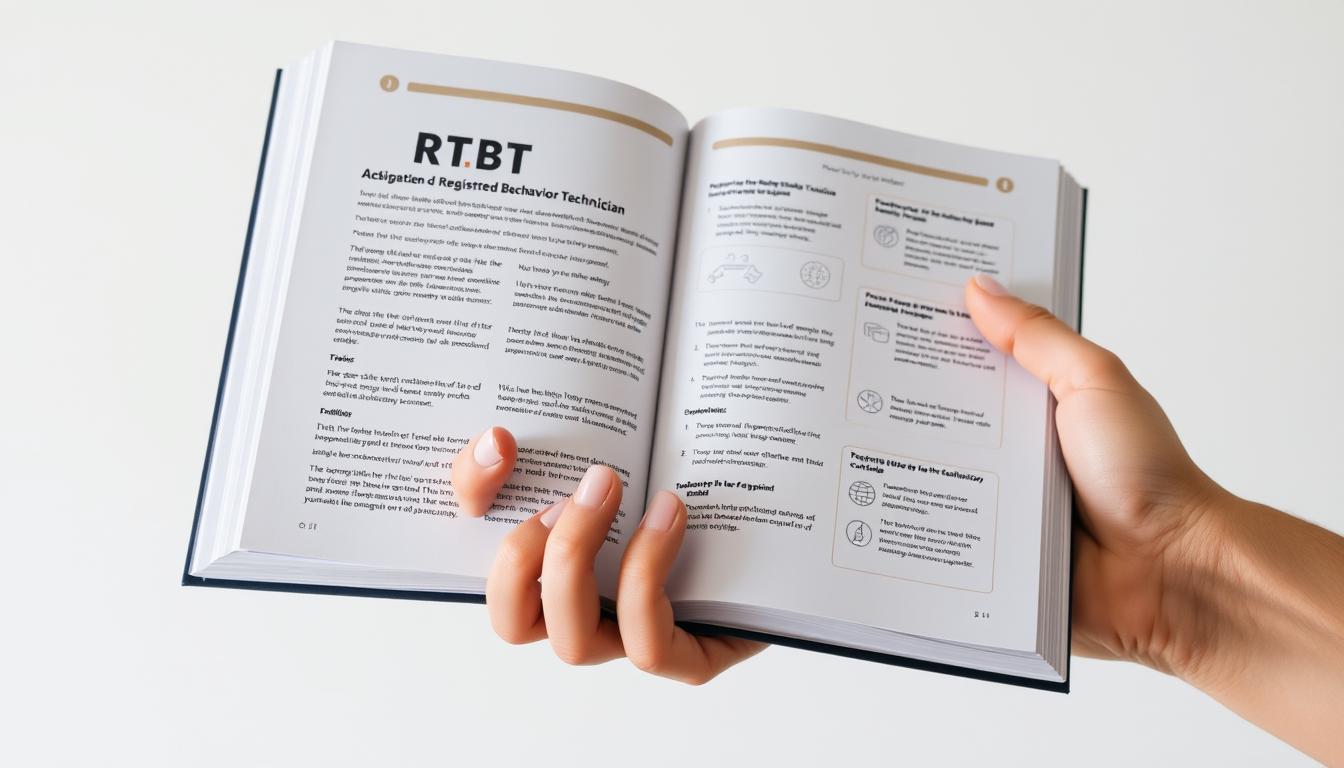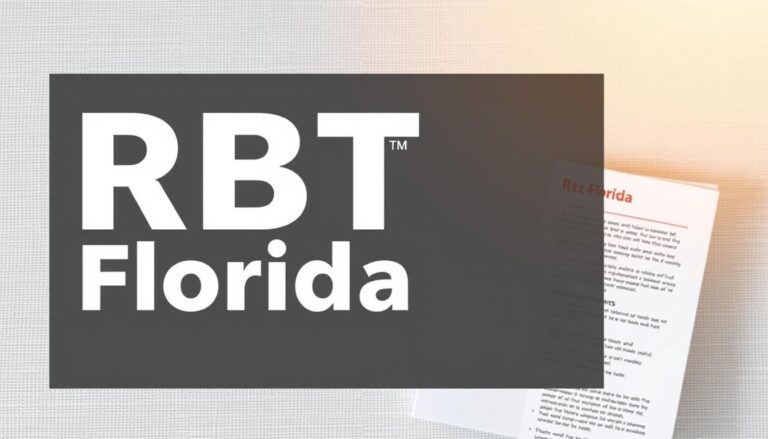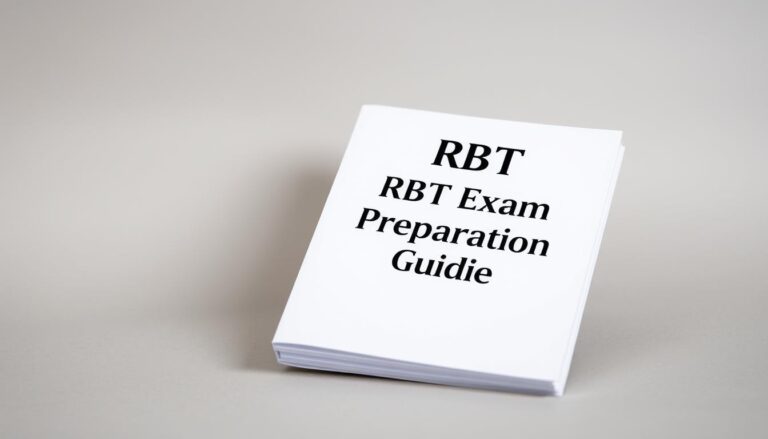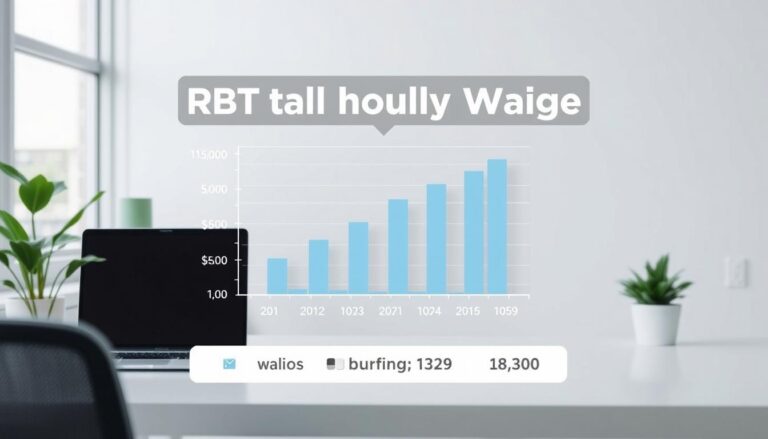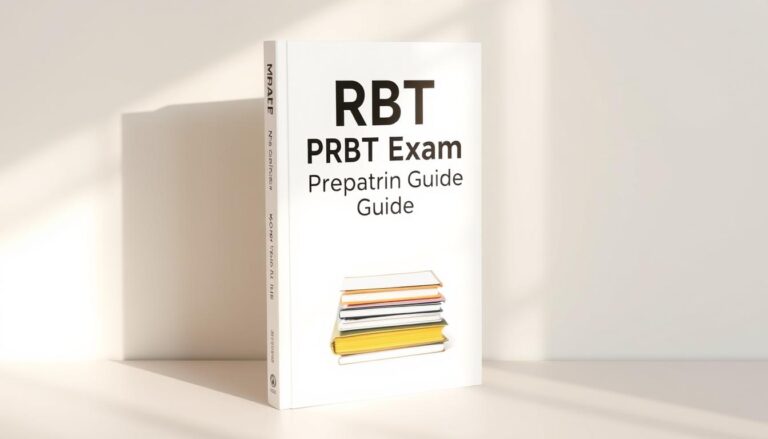Prepare for the RBT Exam: Essential Study Guide
Becoming a Registered Behavior Technician (RBT) is a big step for those who want to help people with autism and developmental challenges. Our guide will show you the best ways to prepare for the RBT exam. This will help you succeed.
The RBT certification process can seem tough, but with the right plan and resources, you can do it. We’ll share key strategies, study methods, and important knowledge areas. This will make sure you’re ready for your certification journey.
To pass the RBT exam, you need to understand applied behavior analysis, professional ethics, and how to help in real situations. We’ll give you a clear path to turn your knowledge into success on the exam.
This guide is for anyone looking to become an RBT, whether you’re new to the field, a healthcare worker, or changing careers. It offers specific advice to help you focus on your goals. Let’s explore the best ways to reach your professional dreams.
Understanding the RBT Certification Requirements
To get RBT certified, you need to follow certain steps. Becoming a Registered Behavior Technician is a big journey. It requires a lot of preparation and knowledge.
Those wanting to be RBTs must meet several important criteria. These steps help make sure you have the right skills for the job. You’ll learn how to give top-notch behavioral intervention services.
Educational Prerequisites
First, you need to meet some basic requirements:
- Be at least 18 years old
- Have a high school diploma or similar
- Be able to read, write, and speak English well
- Finish a 40-hour training program
Experience and Background Checks
Next, you’ll need to meet experience and screening needs:
- Get at least 5 hours of direct supervision from a BCBA
- Pass a detailed background check
- Submit fingerprints for a criminal history check
- Show you’re good at certain behavioral intervention skills
Certification Timeline
The RBT certification process has a set timeline:
- Week 1-2: Finish the initial 40-hour training
- Week 3-4: Get your direct supervision hours
- Week 5: Do your background check
- Week 6: Pass the RBT competency test
- Week 7: Apply for your official RBT certification
Knowing these requirements is key when getting ready for the RBT exam. Make sure to plan each step well. This will help you succeed in your career.
Overview of the RBT Exam Structure and Format
To pass the Registered Behavior Technician (RBT) exam, you need to know its structure and format well. The exam checks if you understand applied behavior analysis. This ensures you’re ready to work in the field.
The RBT exam is a key part of getting certified. It has multiple-choice questions. These questions test your grasp of behavioral analysis principles and how to apply them.
Exam Composition
- Total Questions: 85 multiple-choice questions
- Exam Duration: 2 hours
- Passing Score: 80% (minimum 68 correct answers)
When getting ready for the RBT exam, knowing what it covers is important. Study guides often suggest focusing on certain areas:
| Content Area | Percentage of Exam |
|---|---|
| Measurement | 20% |
| Assessment | 15% |
| Behavior Reduction | 25% |
| Skill Acquisition | 25% |
| Professional Conduct | 15% |
Approach the exam with a plan. Knowing the exam format and what it covers is essential for good preparation. Use detailed RBT exam resources to create study plans that cover each area well.
The exam is taken on a computer at approved centers. You’ll need to show you understand applied behavior analysis, how to collect data, and ethical standards.
Core Components of RBT Task List
To pass the RBT exam, you need to know the core task list well. It’s like a map for your journey to becoming a Registered Behavior Technician. It shows you the key skills and knowledge you must have.
The RBT task list covers important areas for applied behavior analysis. To do well on the exam, focus on three main areas:
- Measurement and Data Collection
- Behavior Reduction Strategies
- Professional Conduct and Scope
Measurement and Data Collection
Being good at data collection is key. It’s about tracking how behaviors change. You need to be able to:
- Record client behaviors accurately
- Use standard measurement tools
- Collect data reliably
Behavior Reduction Strategies
Knowing how to reduce behaviors is important. You need to show you can:
| Strategy | Key Components |
|---|---|
| Positive Reinforcement | Encouraging desired behaviors through rewards |
| Extinction Procedures | Reducing unwanted behaviors by removing reinforcement |
| Differential Reinforcement | Replacing negative behaviors with positive alternatives |
Professional Conduct and Scope
Understanding professional boundaries and ethics is also key. Ethical practice is essential. You need to show you respect client rights, keep professional boundaries, and follow ethical guidelines.
By studying these core components well, you’ll build a strong base for your RBT certification exam. Each area needs focused study and practical skills to succeed.
How to Study for RBT Exam: Proven Strategies
Getting ready for the RBT exam needs a smart study plan. Good study habits can really help you do well and feel more confident. It’s all about making a detailed plan to prepare well.
Here are some key strategies for acing the RBT exam:
- Active Recall Techniques: Test your knowledge with practice questions and self-quizzes
- Spaced Repetition: Study in short, frequent sessions
- Concept Mapping: Use pictures to show how behavioral analysis works
- Group Study Sessions: Study with friends to learn more
It’s important to make good study materials for the RBT exam. Make flashcards with key terms and how they apply to ABA. Focus on understanding the big ideas, not just memorizing facts.
Mnemonic devices are great for remembering tough concepts. Make up acronyms or pictures that help you remember ABA ideas. For example, create phrases that sum up important ABA concepts.
Handling test anxiety is key to getting ready for the exam. Try relaxation methods like deep breathing and positive thinking. Stick to a study plan that lets you rest and avoid getting too tired.
- Take regular breaks
- Try mindfulness meditation
- Eat well and exercise
- Get enough sleep before big study days
Remember, passing the RBT exam is about really getting the basics of behavioral analysis. Stay focused, keep up the good work, and always think positively about learning.
Essential Study Materials and Resources
Getting ready for the RBT exam means picking the right study materials. Our guide will show you the best resources to help you prepare well and feel more confident.
Good candidates use many different study guides. This way, they make sure they know everything they need to know.
Recommended Textbooks and Study Guides
Choosing the right study materials is key to doing well on the exam. Here are some top picks:
- Registered Behavior Technician (RBT) Exam Preparation Guide by Professional Development Resources
- BACB Behavior Technician Task List official manual
- Applied Behavior Analysis Cooper textbook
Online Learning Platforms
Online platforms offer flexible and interactive ways to study for the RBT exam:
| Platform | Key Features | Cost |
|---|---|---|
| Relias Learning | Video lectures, practice quizzes | $99-$199 |
| BACB Authorized Training | Official curriculum, complete modules | $150-$250 |
| ABA Online Courses | Self-paced learning, practice exams | $75-$150 |
Practice Test Resources
Practice tests help you find what you don’t know and build confidence. Here are some good ones:
- Official BACB practice exam
- Behavior Analyst Certification Board mock tests
- Online RBT exam prep websites
Using these resources well will help you study smarter and increase your chances of passing.
Creating an Effective Study Schedule
Creating a good study plan for the RBT exam can really help you succeed. A well-thought-out plan lets you use your time wisely and lowers stress about the exam.
- Check what you know and find what you need to work on
- Set aside specific times for each study area
- Make a study plan that’s realistic and can change if needed
- Have regular review times
Your study plan should mix hard work with being able to keep going. Breaking down hard topics into smaller parts helps avoid burnout and keeps information in your memory longer.
| Study Area | Recommended Study Time | Focus Points |
|---|---|---|
| Measurement Techniques | 3-4 hours/week | Data collection methods |
| Behavior Reduction | 2-3 hours/week | Intervention strategies |
| Professional Conduct | 1-2 hours/week | Ethical guidelines |
Pro tip: Use digital calendars or study tracking apps to keep track of your progress.
Being consistent is very important in getting ready for the RBT exam. Change your study plan if you need to, but always keep working towards your goals.
Understanding Applied Behavior Analysis Principles
To pass the RBT certification exam, you need to know Applied Behavior Analysis (ABA) well. ABA is key to the work of Registered Behavior Technicians (RBTs). It helps them use effective strategies to change behavior.
ABA is a science that studies and changes human behavior. When you study for your RBT exam, you’ll learn about ABA’s main parts. These parts make ABA a strong way to help people.
Basic Concepts and Terminology
RBT candidates must learn important ABA terms:
- Antecedent: Events or circumstances that occur before a specific behavior
- Behavior: Observable and measurable actions
- Consequence: What happens immediately after a behavior
- Reinforcement: Strategies that increase the likelihood of a desired behavior
Behavioral Interventions
Effective behavioral interventions are key in ABA. These strategies help change behaviors in a planned way:
- Positive reinforcement
- Extinction procedures
- Differential reinforcement
- Prompting and fading techniques
Data Collection Methods
Getting accurate data is vital for RBT certification. RBTs need to know how to measure behavior well:
- Frequency recording
- Duration recording
- Interval recording
- Momentary time sampling
Knowing ABA well will help you a lot in preparing for the RBT exam. It will also give you a strong base for your future work.
Mastering RBT Ethics and Professional Conduct
Ethical behavior is key for Registered Behavior Technicians (RBTs). To do well on the RBT exam, knowing the professional standards is essential. Tips for the RBT exam highlight the importance of making ethical choices in applied behavior analysis.
Professionals face complex ethical situations. To study for the RBT exam, it’s important to learn about ethical rules. These rules protect client rights and keep professional relationships clear.
- Understand client confidentiality principles
- Recognize possible ethical problems
- Keep professional boundaries strict
- Use ethical decision-making tools
Important ethical points include:
- Respect for client autonomy
- Procedures for informed consent
- Avoiding conflicts of interest
- Good practices in professional documentation
To prepare for the RBT exam, studying the BACB’s ethical standards is vital. Candidates need to show they understand professional conduct rules well. This is to pass the certification test.
Building strong ethical thinking skills is important. It helps you do well on the RBT exam and start a successful career in applied behavior analysis.
Practice Exams and Assessment Strategies
To pass the RBT exam, you need a good plan and the right tools. RBT exam resources are key to building your skills and confidence before the test.

Mock tests are a great way to get better at the exam. They show you the exam’s layout and where you might need to improve.
Mock Test Approach
- Make a quiet space to test like the real thing
- Practice with timed tests to learn to manage your time
- Choose RBT exam resources with lots of practice questions
- Practice on a digital setup like the real exam
Performance Analysis Strategies
Looking at your practice test scores is very important. It helps you see what you need to work on and how to get better.
- Keep track of how you do in different areas
- Find out where you’re not doing well
- Make a study plan to tackle those weak spots
- Take more practice tests to see how you’re improving
Using these strategies will help you feel more ready for the RBT exam. You’ll be more confident and likely to pass.
Common Challenges and How to Overcome Them
Getting ready for the Registered Behavior Technician (RBT) exam can feel like a big task. Many people face different challenges while studying for the RBT exam. Knowing these challenges is the first step to beating them.
Too much information can be a big problem when studying for the RBT exam. There’s so much to learn, it can be overwhelming. To deal with this, break your study materials into smaller parts.
- Create a structured study schedule
- Use color-coded notes for better organization
- Focus on one topic at a time
- Take regular short breaks to prevent mental fatigue
Understanding complex Applied Behavior Analysis (ABA) concepts can be tough. Active learning techniques can help you get past this. Here are some tips:
- Use visual mind maps
- Practice explaining concepts to others
- Join study groups or online forums
- Watch educational videos about ABA concepts
Keeping motivated is key during your exam prep. Set achievable goals, celebrate your progress, and keep your career dream in mind. Positive thinking and visualization can boost your confidence and study experience.
Every challenge is a chance to learn and get better at behavioral analysis. Stay determined, patient, and focused on becoming a certified RBT.
Time Management During the Exam
Mastering time management is key to passing the RBT exam. Good strategies can help you succeed. You need to plan well to do your best.
Good RBT exam tips include a structured time management plan. How well you handle questions can greatly affect your score.
Pacing Strategies for Optimal Performance
- Divide total exam time by total number of questions
- Allocate approximately 1-1.5 minutes per question
- Use a watch or exam timer to track progress
- Practice time management during mock exams
Question Prioritization Techniques
Here are important strategies for passing the RBT exam:
- Scan questions quickly before starting
- Answer easy questions first
- Mark difficult questions for later review
- Return to challenging questions with remaining time
Creating a mental map of question difficulty is helpful. This way, you can move through the exam confidently. It ensures you get the most points possible.
Remember, time management is about smart progress, not rushing. Your preparation and calm will help you the most.
Last-Minute Review Techniques

Getting ready for the RBT exam needs smart last-minute study plans. These plans help you keep what you’ve learned. Focus on the best ways to study for the RBT exam in the days leading up to it.
To make a good RBT exam study guide for your final review, use these strategies:
- Create condensed summary sheets of critical concepts
- Develop targeted flashcard sets for quick review
- Practice rapid recall of key behavioral analysis principles
- Identify and focus on challenging topic areas
Your last-minute prep should aim to reinforce what you know. Focus on understanding core concepts, not learning new stuff.
| Review Technique | Time Investment | Effectiveness |
|---|---|---|
| Flashcard Review | 15-30 minutes | High |
| Concept Summary Sheets | 30-45 minutes | Medium-High |
| Practice Question Drill | 45-60 minutes | Very High |
Stay calm and confident. Your hard work has prepared you well. Focus on reviewing key concepts and keep a positive attitude during these important moments.
Good review strategies can boost your confidence and readiness for the RBT exam. Trust in your knowledge and focus on showing your understanding of applied behavior analysis principles.
Test Day Preparation Tips
Getting ready for the RBT certification exam needs careful planning. The days leading up to the exam are key. This guide offers practical tips to help you prepare for the RBT exam.
Good test prep means being both physically and mentally ready. How you spend the day before and the morning of the exam can greatly affect your score.
Physical Readiness Strategies
- Get 8-9 hours of uninterrupted sleep the night before the exam
- Eat a balanced, nutritious breakfast with protein and complex carbohydrates
- Stay hydrated but avoid excessive caffeine
- Wear comfortable, layers of clothing
Mental Preparation Techniques
- Practice deep breathing exercises
- Review key concepts briefly
- Visualize successful exam completion
- Maintain a positive, confident mindset
Essential Items Checklist
| Category | Items to Bring |
|---|---|
| Identification | Valid government-issued photo ID |
| Exam Materials | Exam confirmation document |
| Personal Comfort | Water bottle, light snack, layers |
| Emergency | Extra pen, backup ID copy |
Preparing for the RBT certification exam is more than just studying. It’s about showing up ready to do your best. Follow these tips to increase your confidence and success on exam day.
Understanding Scoring and Results
Understanding the RBT exam scoring can be tough. Knowing how your answers translate into results helps lower test stress. It also gives you a clear view of your path to certification.
The RBT exam scores your knowledge of applied behavior analysis. You need to meet a certain score to show you know the important skills.
- Total exam questions: 80-85 multiple-choice items
- Passing score: Typically 70-75% correct responses
- Exam duration: Approximately 2 hours
After finishing the RBT exam, your score is changed into a standard score. This makes sure everyone is judged fairly, no matter the test version or background.
If you don’t pass the first time, many places let you try again. Usually, you can:
- Look at detailed score reports
- Find out what you need to work on
- Make a plan to study better
- Book a retake within a certain time
Pro tip: Study your score report well. It will show you what you need to improve on for the RBT exam.
Post-Exam Steps and Certification Maintenance
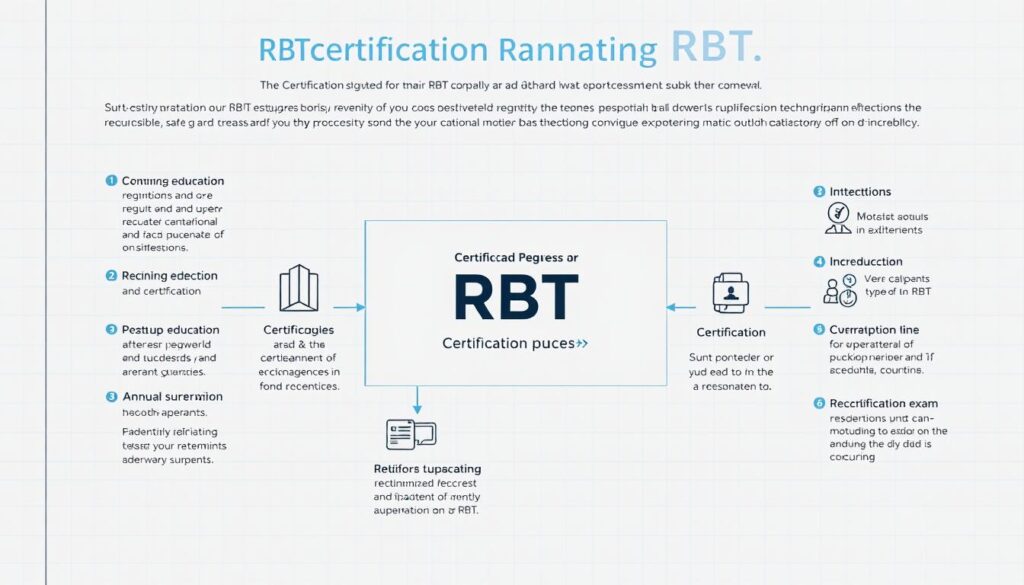
Passing your RBT exam is a big step in your career. After you pass, you need to follow important steps to keep your Registered Behavior Technician (RBT) status.
Getting certified is just the start of your growth. To keep your certification, focus on a few key areas:
- Complete ongoing supervision requirements
- Maintain professional conduct standards
- Renew certification annually
- Participate in continuous professional development
Supervision is key to keeping your RBT certification. A Board Certified Behavior Analyst (BCBA) must watch over your work. Typical supervision includes:
- Monthly direct supervision sessions
- Documentation of performance reviews
- Feedback and professional guidance
Renewing your certification every year has several steps. You’ll need to:
- Complete a background check
- Verify continuing education credits
- Submit renewal application to the Behavior Analyst Certification Board
- Pay required certification renewal fees
Continuing to grow professionally is vital. Look for more training, attend workshops, and learn new behavior analysis techniques. This will improve your skills and make you more attractive to employers.
Conclusion
Getting ready for the RBT exam takes hard work, smart planning, and a thorough learning approach. It’s not just about memorizing stuff. It’s about really getting how applied behavior analysis works and how to act professionally.
Studying for the RBT exam well will really help you. You’ve learned great study methods, like making good study plans and using practice tests. These will help you do well on the exam and grow in your career in behavioral therapy.
This certification is a big step in your career. The skills and knowledge you’ve picked up will help people with autism and behavioral issues. Keep your focus, stay confident, and believe in your preparation.
After the exam, your real work starts. It’s the start of a fulfilling career as a Registered Behavior Technician. Keep learning, stay passionate about helping others, and go into your certification with determination and excitement.
